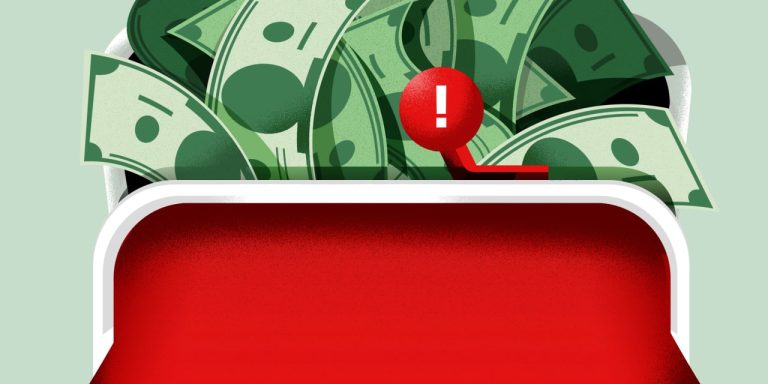Anyone who bought
JPMorgan Tax Aware Equity
hoping to pay lower taxes on their investments is in for a surprise.
On Dec. 14, the mutual fund will pay an estimated $8.17 a share in taxable capital gains distributions, according to
J.P. Morgan.
That’s about 21% of its recent $39.58 share price. Those distributions will occur even if an investor’s shares of the fund (ticker: JPDEX) haven’t gained in value.
Sadly, it isn’t an isolated example. Hefty taxable mutual fund distributions are occurring as investors sell mutual funds to buy cheaper, more tax-efficient exchange-traded funds. Sales of mutual fund shares force fund managers to sell the underlying portfolios’ appreciated stocks, triggering capital gains distributions.
| Fund / Ticker | Estimated Distributions (% per share*) | 2023 Asset Flows |
|---|---|---|
| Delaware Ivy Value / IYVAX | 29.0% | -50.3% |
| Federated Hermes Kaufmann Large Cap / KLCKX | 26.3 | -21.8 |
| Federated Hermes Max-Cap Index / FMXKX | 25.5 | -9.7 |
| Columbia Real Estate Equity / CREEX | 24.8 | -33.3 |
| Diamond Hill Small Cap / DHSCX | 23.1 | -13.0 |
| JPMorgan Tax Aware Equity / JPDEX | 21.4 | -25.2 |
| DWS Equity 500 Index / BTIIX | 19.7 | -35.5 |
*Morningstar 2023 distribution estimates are based on fund company announcements and fund share prices as of Sept. 30, 2023.
Source: Morningstar
A recent Morningstar report found over 200 funds that have announced gains distributions of more than 4% this year. The report’s author, senior analyst Stephen Welch, lays the blame squarely on the fund redemption trend. But perhaps most surprising are distributions from historically tax-efficient funds like JPMorgan Tax Aware and
DWS Equity 500 Index
(BTIIX), which is distributing an estimated 20% of its share value. Both funds have had redemptions in excess of 25% of their assets this year. J.P. Morgan and DWS declined to comment.
For taxable investors, there’s no need to buy mutual funds anymore because ETFs can avoid taxable distributions due to how they’re structured. Brokerage firms also offer super-tax-efficient and low-cost direct-indexed accounts. Investment minimums vary from $2,000 for basic accounts at Fidelity to $250,000 for more bespoke versions at
Morgan Stanley’s
Parametric. They hold stocks directly and harvest losses on the positions to reduce or eliminate taxable distributions.
Yet as legacy products, mutual funds still have a $19 trillion footprint. Many long-term mutual fund investors already have significant capital gains built into their holdings. Selling them to buy ETFs or direct-indexed accounts isn’t so easy if tax avoidance is the goal.
Some investors in direct-indexed accounts still hold mutual funds, and the most sophisticated direct-index providers are helping those investors reduce tax liabilities from appreciated mutual fund positions. About half of the new assets Parametric receives from investors comes in the form of “in-kind” portfolios, says Jeremy Milleson, Parametric’s director of investment strategy. That means instead of investing in the direct-indexed accounts solely with cash, investors are bringing Parametric their entire portfolios—including equities, ETFs, and mutual funds—and Parametric is managing those portfolios along with a direct-indexed component in order to minimize taxes. Parametric sells losing positions in other parts of client portfolios to offset fund distributions.
There’s no reason, however, that investors can’t harvest losses themselves, albeit with less sophistication.
If you have a loss in a mutual fund, sell the fund before its “record date,” typically in December, in order to avoid tax on the distribution. If you like the fund, you can buy it back after 30 days. The wait avoids violating the “wash-sale” tax rule, which voids the write-off from a capital loss if you buy back the same security too soon.
During the wash-sale period, Parametric normally will buy a substitute security that maintains the exposure characteristics of the sold security. That can be tricky with individual stocks. But with a fund it isn’t hard, as its diversified portfolio will correlate with that of another fund. For example, JPMorgan Tax Aware Equity is a large-growth stock fund, so a cheap index ETF like
Vanguard Growth
(VUG) might make a good substitute.
If your shares of a mutual fund have a significant gain, you might prefer holding onto the fund and accepting the distribution. But first, check the nature of the distribution. Capital gains of stocks held in the fund’s underlying portfolio for more than one year are taxed at a maximum rate of 20% when the manager sells those stocks and the gains are distributed. But gains of stocks the manager held less than a year are taxed as income at a rate as high as 37%.
Check the fund’s web page to see what kind of distributions it is paying. If the distributed gains will be short term and taxed at 37%, it may be worth selling the fund if your specific shares have a long-term gain. Your tax will be only 20%. (Investors may also owe state capital gains taxes and the 3.8% net investment income tax.)
For wealthy investors, it may seem pointless to harvest many losses, as the IRS limits the deduction against income to a net capital loss of $3,000 a year. But capital losses can be rolled over into future tax years indefinitely.
One simple solution to the distribution problem is to donate appreciated fund shares to a trust. “Charitable remainder trusts are often used, where [trust grantors] can contribute an asset,” says Brijinder Grewal, a tax specialist at
Charles Schwab.
“The trust can sell it, and the trust pays [grantors] back an annuity payment over their lifetime.” The annuity income isn’t taxed. When the grantor dies, the trust’s remaining assets go to charity.
Given these options, there’s no reason wealthy investors need to settle for a big mutual fund tax bill.
Email: [email protected]
Read the full article here









